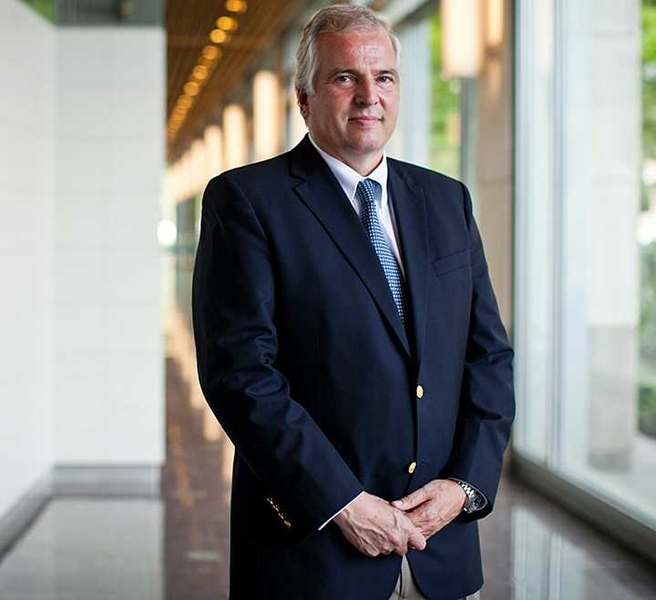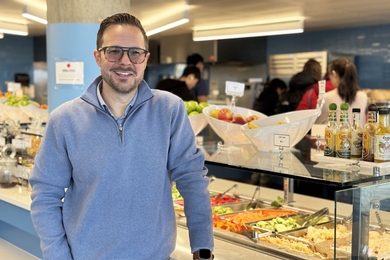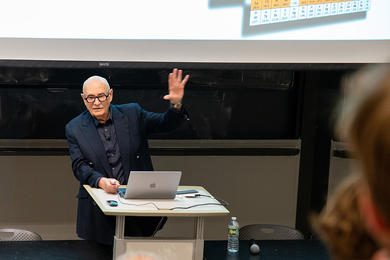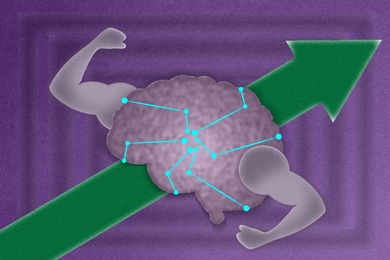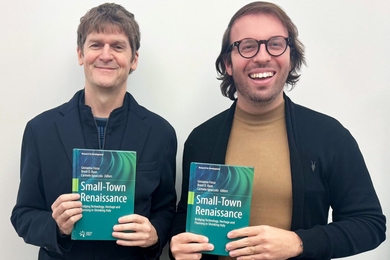Following nine years of service as a departmental and Institute administrator, Provost Chris Kaiser announced today that he plans to step down next month, returning to his post as a professor of biology “to pursue my passion for research and teaching.”
Kaiser has served since July 2012 as provost — MIT’s senior academic and budget officer, with overall responsibility for the Institute’s educational programs. He will step down as provost at the end of October.
“I look forward to returning to the rich and exciting intellectual life of an MIT faculty member,” Kaiser wrote in a letter announcing his decision to the faculty.
In an email sharing the news with the full MIT community, President L. Rafael Reif thanked Kaiser for “his steadying presence and sound advice.”
“Since taking on the role of provost, Chris has served by my side through a challenging period for MIT,” Reif wrote. “We are especially fortunate to have benefited from Chris’s leadership in developing a working consensus on MIT’s plans for Kendall Square. His sensitivity to faculty concerns and ability to bring people together were essential to our progress, and he established a foundation of trust and mutual understanding that will serve the MIT community very well.”
Kaiser will continue to co-lead — with Faculty Chair Steve Hall, a professor of aeronautics and astronautics — a process of community engagement this fall around the issues raised by the July report on MIT’s role in the prosecution of Aaron Swartz. “I am delighted and grateful that Chris has agreed to carry through this responsibility until the process concludes,” Reif wrote.
In his letter to the faculty, Kaiser wrote, “I am grateful to President Reif for the opportunity to serve MIT as provost. This is an amazing job at an amazing institution[.]”
Kaiser added that given the structure of MIT’s faculty — whereby “each faculty member resides a short arm’s reach from the Provost” — he was able to learn about a wide array of disciplines and research projects at the Institute.
“I am proud to say that I took full advantage of this opportunity and not since my freshman year in college have I thought more broadly about the ideas and methods that have been devised to unlock the many secrets of the natural world,” he wrote. “I am indebted to the many faculty and administrators who took the time to explain to a molecular biologist their own special brand of discovery and innovation with insight, patience, and humor.”
Kaiser wrote that with his return to the faculty, he plans to reorient his research focus from basic molecular cell biology to biofuels. He also noted that he plans to take a more active role in online education.
“As provost, I have been deeply involved in the governance of edX and I have been an enthusiastic cheerleader as the revolution in online learning sweeps across MIT,” Kaiser wrote. “But administration and cheerleading are not the same as doing. I am eager to return to the classroom and to actively participate in the development of new educational tools.”
Before becoming provost, Kaiser served for eight years as head of MIT’s Department of Biology, which is home to more than 60 faculty and approximately 400 undergraduates and graduate students.
Kaiser’s term as department head was marked by growth and innovation: He managed the appointment of 14 new junior faculty in the biology department and its affiliates, including the Whitehead Institute for Biomedical Research, the Koch Institute for Integrated Cancer Research, and the Broad Institute. His efforts also more than tripled the number of underrepresented minority graduate students within the biology department.
Kaiser joined the MIT faculty in 1991, after earning his AB in biochemistry from Harvard University and his PhD in biology from MIT. For more than two decades, he has taught “Genetics” (7.03); he has also taught a variety of graduate courses in genetics, molecular biology and cell biology. In 1999 Kaiser was named a MacVicar Fellow, an MIT honor reflecting outstanding undergraduate teaching, mentoring and educational innovation.
In his email, Reif encouraged members of the MIT community to send him suggestions regarding who might serve as MIT’s next provost. Correspondence can be emailed to provostsearch@mit.edu or sent by regular or interoffice mail to Room 3-208. All correspondence received will be treated as confidential.
Kaiser has served since July 2012 as provost — MIT’s senior academic and budget officer, with overall responsibility for the Institute’s educational programs. He will step down as provost at the end of October.
“I look forward to returning to the rich and exciting intellectual life of an MIT faculty member,” Kaiser wrote in a letter announcing his decision to the faculty.
In an email sharing the news with the full MIT community, President L. Rafael Reif thanked Kaiser for “his steadying presence and sound advice.”
“Since taking on the role of provost, Chris has served by my side through a challenging period for MIT,” Reif wrote. “We are especially fortunate to have benefited from Chris’s leadership in developing a working consensus on MIT’s plans for Kendall Square. His sensitivity to faculty concerns and ability to bring people together were essential to our progress, and he established a foundation of trust and mutual understanding that will serve the MIT community very well.”
Kaiser will continue to co-lead — with Faculty Chair Steve Hall, a professor of aeronautics and astronautics — a process of community engagement this fall around the issues raised by the July report on MIT’s role in the prosecution of Aaron Swartz. “I am delighted and grateful that Chris has agreed to carry through this responsibility until the process concludes,” Reif wrote.
In his letter to the faculty, Kaiser wrote, “I am grateful to President Reif for the opportunity to serve MIT as provost. This is an amazing job at an amazing institution[.]”
Kaiser added that given the structure of MIT’s faculty — whereby “each faculty member resides a short arm’s reach from the Provost” — he was able to learn about a wide array of disciplines and research projects at the Institute.
“I am proud to say that I took full advantage of this opportunity and not since my freshman year in college have I thought more broadly about the ideas and methods that have been devised to unlock the many secrets of the natural world,” he wrote. “I am indebted to the many faculty and administrators who took the time to explain to a molecular biologist their own special brand of discovery and innovation with insight, patience, and humor.”
Kaiser wrote that with his return to the faculty, he plans to reorient his research focus from basic molecular cell biology to biofuels. He also noted that he plans to take a more active role in online education.
“As provost, I have been deeply involved in the governance of edX and I have been an enthusiastic cheerleader as the revolution in online learning sweeps across MIT,” Kaiser wrote. “But administration and cheerleading are not the same as doing. I am eager to return to the classroom and to actively participate in the development of new educational tools.”
Before becoming provost, Kaiser served for eight years as head of MIT’s Department of Biology, which is home to more than 60 faculty and approximately 400 undergraduates and graduate students.
Kaiser’s term as department head was marked by growth and innovation: He managed the appointment of 14 new junior faculty in the biology department and its affiliates, including the Whitehead Institute for Biomedical Research, the Koch Institute for Integrated Cancer Research, and the Broad Institute. His efforts also more than tripled the number of underrepresented minority graduate students within the biology department.
Kaiser joined the MIT faculty in 1991, after earning his AB in biochemistry from Harvard University and his PhD in biology from MIT. For more than two decades, he has taught “Genetics” (7.03); he has also taught a variety of graduate courses in genetics, molecular biology and cell biology. In 1999 Kaiser was named a MacVicar Fellow, an MIT honor reflecting outstanding undergraduate teaching, mentoring and educational innovation.
In his email, Reif encouraged members of the MIT community to send him suggestions regarding who might serve as MIT’s next provost. Correspondence can be emailed to provostsearch@mit.edu or sent by regular or interoffice mail to Room 3-208. All correspondence received will be treated as confidential.
